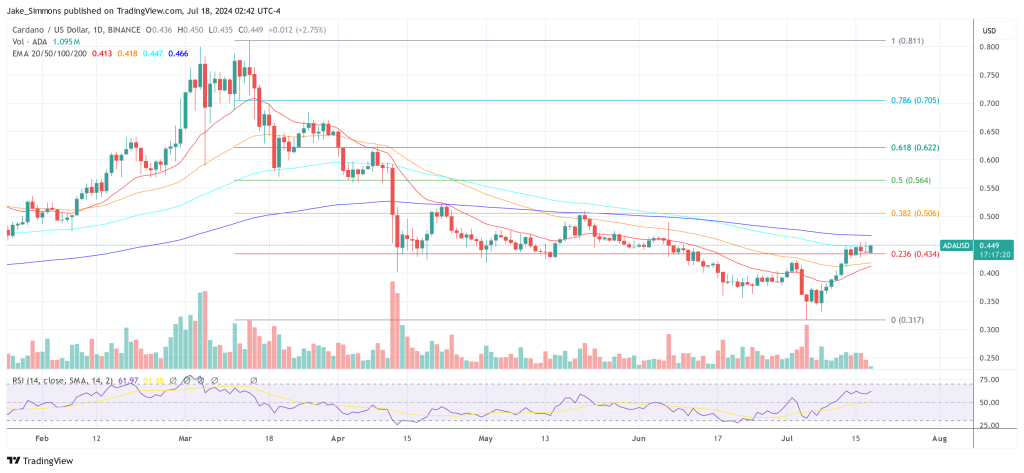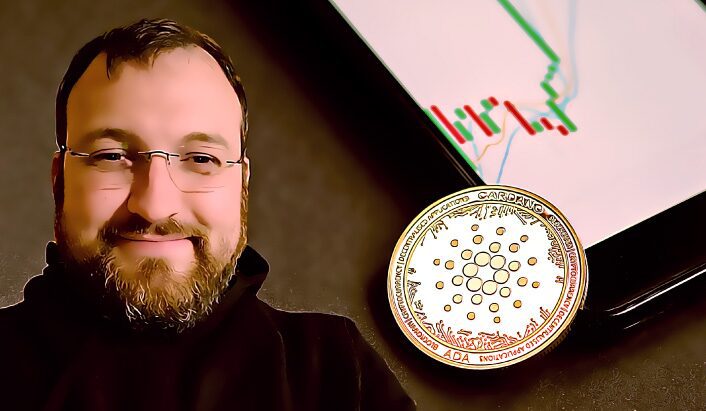Ethereum co-founder Vitalik Buterin and Cardano founder Charles Hoskinson made their opinions on “pro-crypto” politicians known on Wednesday. First, Buterin published his essay, “Against Choosing Your Political Allegiances Based on Who Is ‘Pro-Crypto,’” in which he expressed concerns about the increasing politicization of cryptocurrencies.
This trend has gained prominence since former President Donald Trump, a leading candidate in the upcoming presidential election, became “pro-crypto” and received notable endorsements and contributions from major industry players, such as Jesse Powell (co-founder of Kraken) and the The Winklevoss Twins (founders of Gemini).
Buterin’s Argument on Political Allegiances and Crypto
In his essay In his article published on July 17, Buterin warns against the reductionist approach of supporting political candidates solely on the basis of their cryptocurrency policies. He elaborates on the potential consequences of this strategy, emphasizing the multidimensional nature of politics and its broader implications.
Buterin says, “The political game is much more complicated than just who wins the next election, and there are many levers that your words and actions impact.” He expresses concern that by prioritizing cryptocurrency policy above all else, the community may inadvertently foster a political culture in which pro-crypto rhetoric alone is enough to garner support, neglecting other crucial policy areas.
Buterin’s argument suggests that such a narrow approach could lead politicians to believe that their support for crypto alone can guarantee electoral success, which could encourage them to neglect important issues such as privacy rights, governance ethics, and international cooperation.
Additionally, the Ethereum founder criticizes the idea of using cryptocurrency support as a litmus test for political support. He argues: “By publicly giving the impression that you support ‘pro-crypto’ candidates simply because they are ‘pro-crypto,’ you help create an incentive gradient where politicians come to understand that all they need to get your support is to support ‘crypto.’”
Buterin says this risks simplifying the complex landscape of policy issues into a one-dimensional narrative that may not align with the broader interests of the community or the ethical standards expected of public officials. Buterin challenges the community to take a more holistic approach to political engagement: “If a politician is pro-crypto, the key question to ask is: Are they pro-crypto for the right reasons? Do they have a vision for how technology, politics, and economics should evolve in the 21st century that aligns with yours?”
Cardano Founder Hoskinson Responds
In response to Buterin’s statement, the Cardano founder offered a counterargument that underscores the urgency of political support for crypto-friendly policies, especially given the conflicting regulatory landscape. Hoskinson’s response, articulated in a series of posts on X, argues for the strategic need to support candidates who oppose restrictive cryptocurrency regulations.
Hoskinson points out“My first goal has always been to keep the government completely out of cryptocurrencies. In places where that’s not possible, the choice is pretty clear.” He argues that in environments where government intervention is unavoidable, supporting pro-cryptocurrency politicians becomes essential to protect the industry from adverse regulations.
“Politics is a game of cause and effect. If politicians understand that bullying and harassment in our industry results in lost elections, then suddenly they avoid doing it. It’s not complicated, and you don’t have to invent massive cognitive hierarchies to excuse your personal disgust for certain people,” Hoskinson writes.
Continuing his argument, Hoskinson Express strong opposition to policies that threaten the operational integrity and freedom of the crypto industry. The Cardano founder lists several opposing actions, such as the potential development of Central Bank Digital Currencies (CBDCs)legal action against non-custodial wallets and the systematic criminalization of crypto leaders.
Hoskinson points out: “If they want a CBDC, prosecute non-custodial wallets, systematically jail crypto executives, call everyone a security, and intimidate and harass exchanges, then we are not voting for them.”
The Cardano executive directly contrasts Trump and Biden’s attitudes toward crypto, saying, “A vote for Biden is a vote for the death of the American crypto industry.” He also attributes Trump’s more favorable stance toward crypto due to his willingness to Ross Ulbricht routeThe phrase and a general pro-crypto rhetoric as reasons for its approval.
“Biden will leave him in prison for life. There are real political differences between Biden, who wants to destroy our industry, and Trump/Kennedy, who accept it, (…) These statements are based on their actual behavior in court, politics, and vetoes – not personal preferences. We have all endured terrible things this crypto winter. I have seen friends like Roger and CZ get arrested. Good companies are demonized and sued. This has to stop, and it will not stop if there are no political consequences. So in 2024, #VoteCrypto,” the Cardano founder concluded.
At press time, Cardano was trading at $0.449.

Featured image from YouTube, chart from TradingView.com


